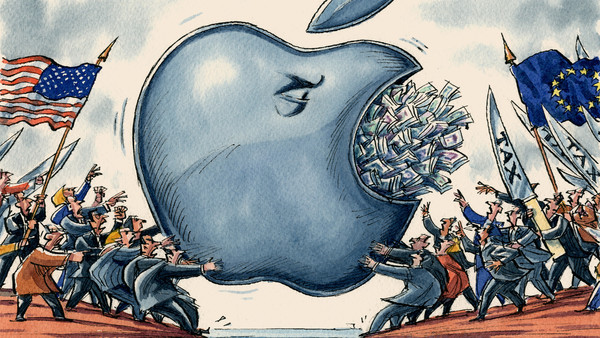Alphabet and Apple spell global tax war

Alphabet and Apple spell global tax war
original article by John Gapper, Financial Times
---------------------------------------
A fiscal system formed under the League of Nations in 1928 is about to fracture and fall apart

Th e uproar about Google paying £130m in back taxes and raising the amount it pays in the UK by just £10m a year is merely a little local difficulty compared with what comes next. Apple could soon be instructed to pay billions, triggering a showdown between Europe and the US and a potential breakdown of the international tax system. This sounds apocalyptic but it is a decent bet.
If you doubt it, consider the following. From irate taxpayers and infuriated politicians to defiant bosses of multinationals, many are at the ends of their tethers about corporate tax. Countries in the Organisation for Economic Co-operation and Development have spent two years trying to fix the system; one of the first results, Google’s UK deal, has gone down terribly.
Apple disclosed on Tuesday that its minimally taxed pot of overseas cash has grown to $200bn. Tim Cook, chief executive, flew to Brussels last week to protest at the likelihood of being told by the European Commission to pay a chunk to Ireland, where it has operated since 1980. American politicians are angry at what some call “a direct threat to the interests of the US”.
The question on which the future of global tax harmony rests is not whether Google should pay more in the UK and less in Ireland. It is whether US multinationals pay much tax anywhere on overseas earnings, and whether they ever will. For now, billions in profits are booked in Bermuda and offshore entities, annoying everyone.
The centre is not holding for Alphabet, Google’s parent group, as France and Italy reinterpret their laws to make it pay more tax before local profits escape to Ireland and then, via the Netherlands, to Bermuda. It will surely fracture over EU cases against Apple and Amazon since the US lives in hope that one day, over the rainbow, their cash will come home to be taxed.
We face a historic moment. The tax system formed under the League of Nations in 1928 relies on the idea that companies should be taxed largely where profits are created, not where they sell their products and services. It could soon fall apart and what happens then is anyone’s guess, although it will not be pretty and will probably resemble a global tax war.
Multinationals, especially US corporations subject to America’s dysfunctional tax laws, stretched rules to the point where the result appals taxpayers. They did so with the aquiescence of offshore havens and countries such as Ireland and Luxembourg.
The European taxpayer in the street might just credit the idea that Alphabet or Apple create, design and manage their products and services from California, and so the US should receive a larger share of its profits than Italy or the UK. This is the intended outcome of international tax treaties.
Why, though, should he or she accept that intellectual property can be shifted to any convenient spot, according to which jurisdiction levies the least tax? Google’s search engine was not invented in Bermuda and Apple did not develop the iPhone in a tax-advantaged entity sitting between Ireland and the US. Such structures obey the letter of the law but they are nonsensical.
They exist to hold what is in theory a US tax liability until Congress gets around to cutting the US corporate tax rate from 40 per cent (including federal and state taxes) and luring the cash back. Yet the chance of Apple repatriating the entire $200bn is slim; some of it will never return, being invested instead in overseas expansion.
Mr Cook would leap out of his chair to protest at this point. These were and are the rules, he would say. By all means change them but do not impugn Apple’s honour by calling it a tax dodger or raiding its coffers retrospectively for alleged underpayments going back a decade. The EU should not use the device of state aid rules to interfere in Ireland’s right to set corporate tax rates.
Well, perhaps. Without attributing malice to Steve Jobs, both Apple, the company he co-founded, and Ireland were pretty ingenious about tax; they can hardly complain if Margrethe Vestager, EU competition commissioner, is ingenious in return. As to Apple’s complaint of retrospective legislation, the Supreme Court often strikes down US state laws long after they were passed, no matter how inconvenient it is for anyone who is affected.
The US Treasury is lining up on its companies’ side. It worries about taxpayers footing the bill in forgone tax receipts if more is taken by European countries. The Senate finance committee wants it to consider retaliating by double taxing European companies if billions are bitten from Apple.
The incentive to carry on co-operating is slim. The UK tax authorities tried to raise Google’s bill while still treating its British arm as a minor contributor to global profits — a plausible view under revised OECD guidelines. They are now in disgrace for not being tough enough while France and Italy, which have changed tack to enforce far higher local taxes, bask in approval.
It is clear where this ends. When the global tax consensus cannot hold, it is every nation for itself. This was what they tried to remedy in 1928 but the goodwill is fading fast.


I'm not sure what this means for Joe Sixpack... but probably nothing good.